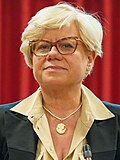List of presidents
| N° | Portrait | Name (Born–Died) | Term of office | ||
|---|---|---|---|---|---|
| 1 |  | Romano Prodi (1939– ) | 14 October 2007 | 16 April 2008 | |
| Vacant | 16 April 2008 | 7 November 2009 | |||
| 2 |  | Rosy Bindi (1951– ) | 7 November 2009 | 19 April 2013 | |
| Vacant | 19 April 2013 | 15 December 2013 | |||
| 3 |  | Gianni Cuperlo (1961– ) | 15 December 2013 | 21 January 2014 | |
| Vacant | 21 January 2014 | 14 June 2014 | |||
| 4 |  | Matteo Orfini (1974– ) | 14 June 2014 | 17 March 2019 | |
| 5 |  | Paolo Gentiloni (1954– ) | 17 March 2019 | 22 February 2020 | |
| 6 |  | Valentina Cuppi (1983– ) | 22 February 2020 | 12 March 2023 | |
| 7 |  | Stefano Bonaccini (1967– ) | 12 March 2023 | Incumbent | |
Presidents timeline










